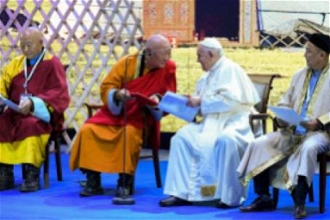China: Mongolian-speaking families resist government's new language policy for schools

image CSW
Source: CSW
Thousands of ethnic Mongolian students and parents have boycotted classes in protest against the Chinese government's decision to make Mandarin Chinese the language of instruction in three subjects in schools in the Inner Mongolia Autonomous Region, referred to by some activists and rights groups as 'Southern Mongolia'.
On 1 September, the first day of the school year, schools across the region remained empty, as students did not attend in order to protest the policy. According to the Southern Mongolian Human Rights Information Center (SMHRIC), video clips shared by parents show empty classrooms and campuses thanks to "a well-planned total school strike organized by Mongolians." At the same time, students have begun to protest on the streets, chanting "Let us defend our legal rights" and "Let us defend our culture and heritage." The authorities have responded by imposing curfews in some areas. SMHRIC believes the class boycotts have widespread support from ethnic Mongolians, including some officials.
According to Article 4 of China's constitution: "All areas inhabited by ethnic minorities shall practice regional autonomy, establish autonomous organs, and exercise the power to self govern."
The constitution also prohibits discrimination and oppression of such groups and guarantees their freedom to "use and develop their own spoken and written languages, and to preserve or reform their own ways and customs." |
However, rights groups and international media continue to report violations of the rights of ethnic Mongolians, including land confiscation; those who protest these violations or advocate for human rights are often subject to arbitrary detention.
The constitution also prohibits discrimination and oppression of such groups and guarantees their freedom to "use and develop their own spoken and written languages, and to preserve or reform their own ways and customs."
However, rights groups and international media continue to report violations of the rights of ethnic Mongolians, including land confiscation; those who protest these violations or advocate for human rights are often subject to arbitrary detention.
Other ethnic groups in so-called 'autonomous regions' include the predominantly-Muslim Uyghurs and the predominantly-Buddhist Tibetans. Both groups have been scarred by ongoing and severe human rights violations including mass arbitrary detention and torture, as well as egregious restrictions on the right to freedom of religion or belief. Any form of protest by Uyghurs or Tibetans is brutally suppressed by the authorities.
CSW's East Asia Team Leader Benedict Rogers said: "CSW calls on the government of China to guarantee the right to peaceful protest. The government's decision to make Chinese the language of instruction in schools in the Inner Mongolia Autonomous Region, apparently without any consultation with students and parents, follows a pattern of restrictions on the rights of ethnic groups. We call on China to uphold the cultural rights of all ethnic groups, including the right to freedom of religion or belief."
The movement among ethnic Mongolians has unfolded at the same time as a tour of Europe by China's Foreign Minister Wang Yi, his first trip overseas since the COVID-19 pandemic. Visits to France, Germany, Italy, the Netherlands and Norway last week were overshadowed by human rights concerns, as Hong Kong, Uyghur and Tibetan activists peacefully called for freedom and human rights in each of the cities.
Human rights concerns were also raised in meetings throughout the visit. In Germany, German foreign minister Heiko Maas raised concerns regarding the situation in Hong Kong, and called for access to the Uyghur Region for international observers. Italian foreign minister Luigi Di Maio also raised concerns regarding the new national security law in Hong Kong. Dutch foreign minister Stef Blok called attention to the restriction of freedom of religion or belief in the country, while French President Emmanuel Macron expressed strong concerns about Hong Kong and human rights.
Benedict Rogers added: "CSW welcomes the fact that several states raised human rights concerns in their meetings with Foreign Minister Wang Yi last week. We call on the international community not to be intimidated by China's economic and geopolitical influence, and to continue to go on the record over serious human rights issues at every opportunity."
LINK
CSW China Report: Repressed, Removed, Re-Educated: The stranglehold on religious life in China


















